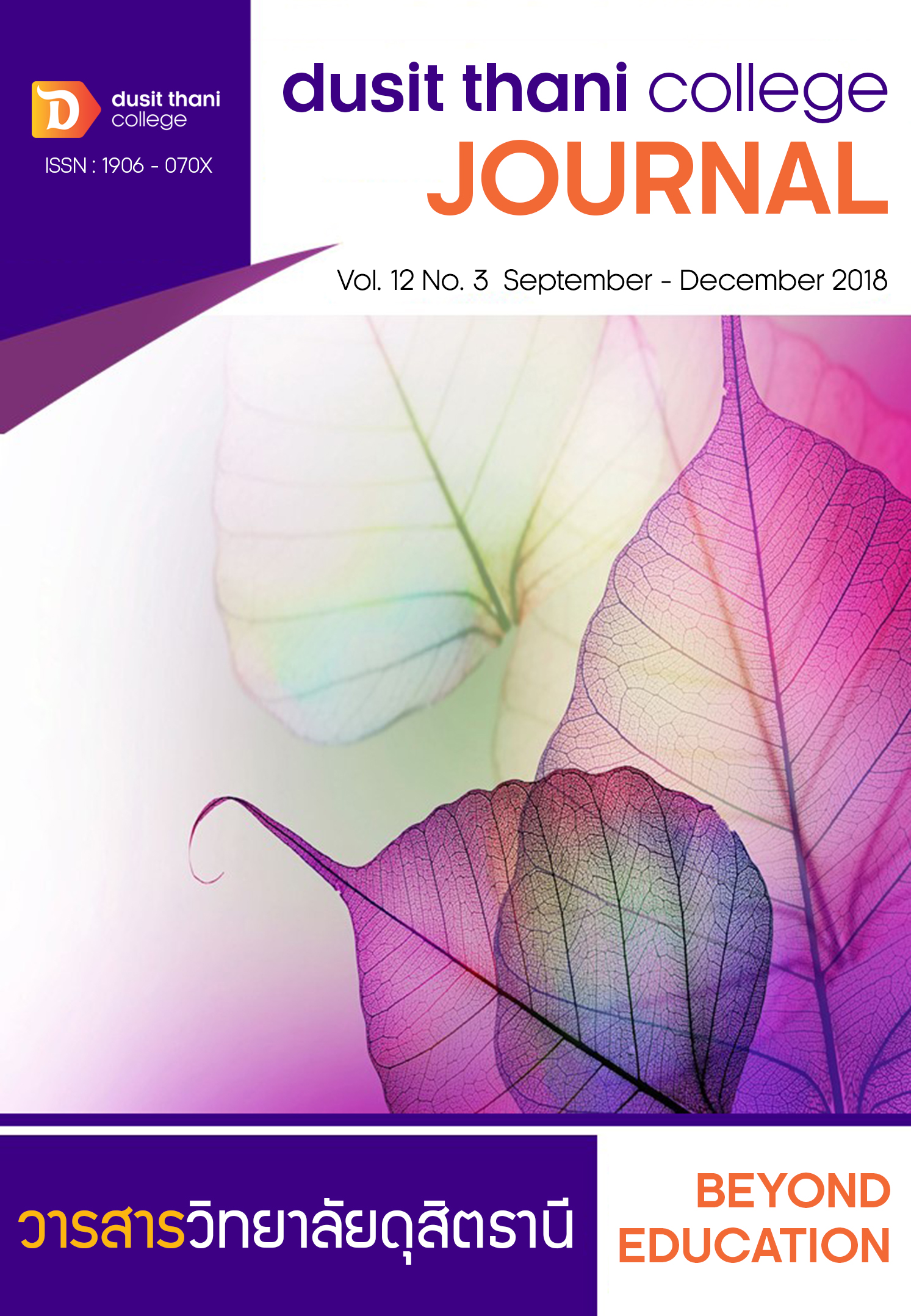ประสิทธิผลการบริหารสถานศึกษาสำนักงานคณะกรรมการการอาชีวศึกษา ตามเกณฑ์ของรางวัลคุณภาพแห่งชาติมัลคอล์ม บอลดริจ
Main Article Content
บทคัดย่อ
การวิจัยครั้งนี้มีวัตถุประสงค์เพื่อ 1) ศึกษาประสิทธิผลการบริหารสถานศึกษา สังกัดสำนักงานคณะกรรมการการอาชีวศึกษา ตามเกณฑ์ของ The Malcolm Baldrige National Quality Award 2) ศึกษาปัจจัยที่ส่งผลต่อประสิทธิผลการบริหารสถานศึกษา สังกัดสำนักงานคณะกรรมการการอาชีวศึกษา ตามเกณฑ์ของ The Malcolm Baldrige National Quality Award ผู้ให้ข้อมูลประกอบด้วย ผู้อำนวยการสถานศึกษา รองผู้อำนวยการสถานศึกษา และครูหัวหน้าแผนก จำนวน 546 คน จาก 207 วิทยาลัย โดยวิธีการสุ่มแบบแบ่งชั้นภูมิอย่างมีสัดส่วน (Proportional Stratified Random Sampling) เครื่องมือที่ใช้ในการวิจัย คือ แบบสอบถาม สถิติที่ใช้ในการวิเคราะห์ข้อมูล ได้แก่ สถิติบรรยาย การหาค่าสหสัมพันธ์ของเพียร์สัน และการวิเคราะห์ถดถอยพหุคูณแบบเชิงชั้น (Hierarchical Multiple Regression Analysis)
ผลการวิจัย พบว่า ประสิทธิผลการบริหารสถานศึกษา สังกัดสำนักงานคณะกรรมการการอาชีวศึกษาอยู่ในระดับมาก (4.14) โดยด้านภาวะผู้นำมีประสิทธิผลในระดับสูงสุด (4.24) รองลงมาคือ การวางแผนเชิงกลยุทธ์ การมุ่งเน้นกระบวน การบริหารงาน การมุ่งเน้นทรัพยากรบุคคล ผลการจัดการศึกษา การมุ่งเน้นผู้เรียนและผู้มีส่วนได้เสีย และการวัดการวิเคราะห์และการจัดการความรู้ ตามลำดับ ปัจจัยที่ส่งผลต่อประสิทธิผลการบริหารสถานศึกษา สังกัดสำนักงานคณะกรรมการการอาชีวศึกษา โดยรวมทั้ง 4 ปัจจัย ประกอบด้วย ปัจจัยองค์การ ปัจจัยสภาพแวดล้อม ปัจจัยส่วนบุคคล และปัจจัยนโยบายการบริหาร และการปฏิบัติ มีความสัมพันธ์อย่างมีนัยสำคัญทางสถิติที่ระดับ 0.01 และสามารถทำนายประสิทธิผลการบริหารสถานศึกษา ได้ร้อยละ 87.2 โดยปัจจัยนโยบายการบริหารและการปฏิบัติสามารถอธิบายความแปรปรวนประสิทธิผลการบริหารสถานศึกษามากที่สุด รองลงมาได้แก่ ปัจจัยส่วนบุคคล ปัจจัยสภาพแวดล้อม และปัจจัยองค์การ ตามลำดับ
Article Details
นโยบายการพิจารณากลั่นกรองบทความ
- บทความวิจัยและบทความวิชาการทุกเรื่องที่จะได้รับการตีพิมพ์ต้องผ่านการพิจารณากลั่นกรองโดยผู้ทรงคุณวุฒิ (Peer Review) ในสาขาที่เกี่ยวข้อง จำนวน 3 ท่าน/บทความ
- บทความ ข้อความ ภาพประกอบและตารางประกอบที่ลงตีพิมพ์ในวารสารเป็นความคิดเห็นส่วนตัวของผู้เขียน กองบรรณาธิการไม่จำเป็นต้องเห็นด้วยเสมอไป และไม่มีส่วนรับผิดชอบใด ๆ ถือเป็นความรับผิดชอบของผู้เขียนแต่เพียงผู้เดียว
- บทความที่จะได้รับการตีพิมพ์จะต้องไม่เคยตีพิมพ์ เผยแพร่ที่ใดมาก่อน และไม่อยู่ระหว่างการพิจารณาของวารสารฉบับอื่น หากตรวจสอบพบว่ามีการตีพิมพ์ซ้ำซ้อน ถือเป็นความรับผิดชอบของผู้เขียนแต่เพียงผู้เดียว
- บทความใดที่ผู้อ่านเห็นว่าได้มีการลอกเลียนหรือแอบอ้างโดยปราศจากการอ้างอิง หรือทำให้เข้าใจผิดว่าเป็นผลงานของผู้เขียน กรุณาแจ้งให้กองบรรณาธิการวารสารทราบจะเป็นพระคุณยิ่ง
เอกสารอ้างอิง
2. _____. (2013). Baldrige National Quality Program. Bangkok: Baldrige National Quality Program.
3. Brown, B. (2001). Rethinking How Students Learn. New York: The free Press.
4. Busher, T. (2006). Learning for Life in Our Time. San Francisco: Jossey-bass.
5. Education Commission. (2012). Management Education. Bangkok: Education Commission.
6. Hall, S. (1996). The art of negotiation: An everyday experience. London: Sage.
7. Northouse, M. (2007). A Survey of Theory and Research. New York: The Free Press.
8. Steers, G. (1977). Creating Training miracles. Sydney: Prentice Hall.
9. Van, D. V. and et.al. (2008). Strategic management: Competitiveness and globalization. Ohio: Thomson South Western.
10. Vecchio, S. (1991). A new look at management communication in management.
San francisco: McGraw-Hill Book Company.
11. Vocational Education Commission. (2008). Management Vocational Education. Bangkok: Vocational Education Commission.
12. _____. (2014). Management Vocational Education. Bangkok: Vocational Education Commission.
13. _____. (2015). Management Vocational Education. Bangkok: Vocational Education Commission


